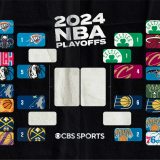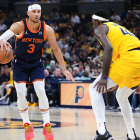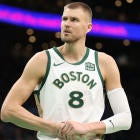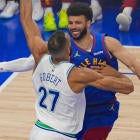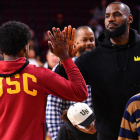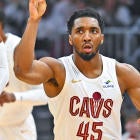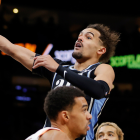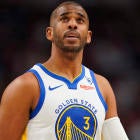
No team in NBA history has entered a season with a wider-range of realistic outcomes than the 2020-21 Brooklyn Nets. They have two superstars, but both are coming off major injuries (and in neither case is the major injury in question their first). They have a widely beloved new head coach (and a widely beloved assistant) whom those stars had a hand in picking, but that coach has never held a full-time coaching job at any level in his life. They have several valuable role players that mostly do the same exact things.
There is a version of this Nets season in which Brooklyn has the best record in the NBA and coasts to a championship. There is another version, even with Durant and Irving playing, in which the roster never coalesces and a notoriously moody locker room implodes, leaving the Nets with something like a No. 6 or No. 7 seed. The Nets are hoping and building for the former.
But the best version of their offseason probably involves acknowledging the latter as, if nothing else, a set of conditions to avoid. While the goal is going to be the addition of a third star, the simpler act of filling holes is probably going to be more important next season. Who is defending opposing perimeter stars on this roster right now? Do they have the personnel to run any non-dropback coverages against pick-and-roll? Kyrie Irving got away with excessive isolation in Cleveland because LeBron James could function as a point guard. Kevin Durant can't. Who is setting up teammates here?
These are solvable problems, but they're numerous. What the Nets prioritize now is going to go a long way in determining which end of the contention spectrum they land on next season. This offseason preview will chart the many, many paths they could theoretically take.
One note before beginning: We will be using Spotrac for player salaries, and 2019-20 cap numbers for this exercise as a whole. That includes previously agreed-upon numbers like the rookie scale and the minimum salary. A frozen cap is the likeliest outcome of negotiations between the league and the NBPA, but these numbers could theoretically change in either direction.
Under the assumption that the 2019-20 numbers will be used, these are the pertinent numbers for these projections.
Salary cap | $109,140,000 |
Luxury tax | $132,627,000 |
Luxury tax apron | $138,928,000 |
Salary floor | $98,226,000 |
Non-taxpayer mid-level exception (Year 1) | $9,258,000 |
Taxpayer mid-level exception (Year 1) | $5,718,000 |
Cap room mid-level exception (Year 1) | $4,767,000 |
Bi-annual exception | $3,623,000 |
Cap situation and overall finances
Here's a prediction that isn't quite as bold as it might appear: Brooklyn is going to have the most expensive roster in the NBA next season. At this moment the they trail the 76ers, Warriors and Celtics, but all three are operating with serious financial constraints that the Nets, for the time being, probably are not.
Joe Tsai is worth almost $15 billion, making him the NBA's second-richest owner, and unlike Steve Ballmer, his team won't realistically have a hard cap to worry about. The New York television market is a strong defense against pandemic-induced revenue loss, and while there's some sleuthing involved here, we can somewhat safely assume that promises were made when Kevin Durant signed in Brooklyn. This is a somewhat common practice among top-tier NBA free agents. LeBron James has consistently used short-term deals to pressure his teams into paying the tax, and Durant did the same to Golden State. The Warriors would have happily paid the repeater tax to keep him. His Brooklyn deal included three guaranteed seasons, but he wouldn't have signed there without certain assurances, and if the Nets don't hold up their end of the bargain, he can leave in the summer of 2022. Even if that wasn't true, angering Kevin Durant isn't a wise way of doing business.
So the Nets are paying the tax. The question is, by how much? Right now, they're around $10 million above the projected line.
| Players | 2020-21 Salary |
|---|---|
Kevin Durant | $40,108,950 |
Kyrie Irving | $33,329,100 |
$16,203,704 | |
Taurean Prince | $12,250,000 |
$11,454,048 | |
$10,375,678 | |
Garrett Temple* | $5,005,350 |
$3,909,902 | |
$2,002,800 | |
Timothe Luwawu-Cabarrot* | $1,824,003 |
$1,780,152 | |
Nic Claxton | $1,517,981 |
No. 19 pick | $2,689,920 |
Total | $142,451,588 |
These projections don't factor in a few important points:
- Joe Harris is probably coming back, if only because the Nets would have no way of replacing him if he doesn't. Brooklyn needs to top the Mid-Level Exception comfortably to ensure he doesn't have a wandering eye. Let's peg his 2020-21 salary somewhat conservatively at $13 million.
- Speaking of the Mid-Level Exception, the Nets have the Taxpayer version and are probably going to use it. That's another $5.7 million.
- Brooklyn has been linked to every former All-Star on the trade market. There's a good chance they're making a major trade, and if they do, they're probably taking on some money.
Before even factoring in a trade, the Nets are hovering around $161 million. With one? There are scenarios in which the Nets pay over $100 million in taxes alone. If that's what it takes to build a champion? So be it.
We'll dive into their trade prospects a bit later. The pertinent question for now is what to do about that mid-level exception? The obvious priorities are defense and an improvement at the power forward spot. Should the Nets pursue the latter, they'd have a leg up over the other taxpaying teams through their ability to offer a starting role.
Serge Ibaka is probably a bit ambitious, but if he looks for a one-year deal before re-entering a better free-agent market next offseason, he obviously has a relationship with Durant dating back to their time in Oklahoma City. His shooting is an obvious plus, and his mobility would offer an alternative at center late in games in case the drop-defense favored by Jordan and Allen isn't viable. JaMychal Green checks many of the same boxes, should he decide to opt out. Paul Millsap can't play center, but if his minutes are limited, he fits the bill fairly well. Markieff Morris was barely worth the minimum before joining the Lakers. Now he's a viable mid-level candidate as well, though likely a lower priority.
Wesley Matthews and Justin Holiday could help fill the defensive void, and the latter might be open to a discount if it means joining his brother Jrue through trade (more on that later). Given their abundance of guards, though, a forward might be likelier. Brooklyn has enough offensive firepower to endure Torrey Craig's offense. He would be one of the few players in this class that they can afford who has a real chance defending other elite forwards. Still, the superior talent at power forward makes it the likelier option in this slot. Watch out for Millsap as the compromise choice.
One last note: the Nets already have 13 roster spots accounted for if they keep Temple and Luwawu-Cabarrot, and that's before factoring in Harris, a mid-level signing or any of their other lower-level free agents. That's going to create a crunch, because the Nets are invested in most of the players on their rosters. Yes, it would be easy to say players like Musa and Kurucs probably aren't getting real minutes on this roster so they should be deposed, but the Nets recently spent first-round picks on them. In that sense, don't be surprised if the Nets make a consolidation move of some sort. They need roster spots and probably want to get some value out of those they won't be keeping. A big trade could solve that, but so could some smaller ones. Another option on this front might be foregoing a rookie addition this offseason.
Draft capital
- 2020 picks: Nos. 19, 55
- Owed future first-round picks: N/A
- Incoming future first-round picks: N/A
The Nets are the NBA's ultimate win-now team. Odds are, no rookie is going to play meaningful playoff minutes this season, and while young assets are essential to the maintenance of a contender, most contenders lack the available playing time to actually develop them properly. In other words: don't rule out a scenario in which the No. 19 pick isn't on Brooklyn's roster next season. That might involve a trade for a future pick, or it might mean using the pick on a foreign player that can be stashed abroad.
If the Nets do decide to keep the pick and use it, this would be the place to take a swing on the two-way wing they'd likely need to forego in free agency if power forward is the priority. This draft has plenty of them. Some combination of Saddiq Bey, Desmond Bane, Jaden McDaniels, Aaron Nesmith, Tyrese Maxey and Josh Green will be available. That combination gives them a choice of practically any flavor of 3-and-D wing, but if they want to find someone likelier to contribute right now, there's a reasonable argument for Brooklyn as a trade-up candidate.
The Nets may justifiably be gunshy about dealing future picks after the Boston fiasco. If nothing else, they've learned their lesson on lottery-protections. But if ever there was a time to go all-in, it would be now. Kevin Durant is on this team. This is the best roster the Nets have ever had. If it takes a future pick to secure a safer prospect like Devin Vassell or Isaac Okoro, it would be well worth it for a Nets team that has waited decades to reach this point.
And hey, if nothing else, moving into the top-10 might give the Nets another premium asset to offer for star No. 3. Fortunately, they aren't lacking in that respect.
Trade options
Everything Brooklyn does this offseason is going to flow out of the third star conversation, and it's a complicated one. The Nets have the pieces to go get, at the very least, a borderline All-Star, but they have politics to navigate. An ideal fit, for example, would be Rudy Gobert. The Nets sorely need a defensive anchor, and Gobert is one of the best in the business. But Durant and Irving seem hellbent on sticking with Jordan as their starting center. It's no coincidence that Jacque Vaughn's first move after taking over for Kenny Atkinson was putting him into the starting lineup.
That's the minefield Sean Marks is tiptoeing through. He can't just find high-level players. He needs to find players that Durant and Irving approve of. That isn't an exact science, but it probably rules out a center upgrade, and another high-usage ball-handler is probably out of the question as well. Durant and Irving won't want to watch Victor Oladipo run 30 pick-and-rolls every night. Zach LaVine and DeMar DeRozan are out for that same reason, though their defensive woes don't help. This is very much their team. Whoever they add needs to support them, and star-power shouldn't be the only consideration.
Bradley Beal is the perfect choice based on his shooting, but everybody wants Beal, and for the time being, Washington doesn't appear all that interested in sending him anywhere. Even if they did, better offers would probably emerge than anything built around Caris LeVert, a major injury risk.
That leaves Jrue Holiday as the best choice on the board. With the possible exception of LeBron James, he could comfortably defend the best perimeter scorer on any opponent. He's a viable third scorer and decent enough shooter, but has always functioned better playing alongside a point guard. Take this for what it's worth, but he also just won the Tywman-Stokes Teammate of the Year award. Durant and Irving aren't exactly known for their locker room demeanor. Holiday could provide a meaningful counterbalance.
LeVert is a reasonable start at least as an asset proposition, but it's fair to question how interested the Pelicans would be in yet another injury risk that can't shoot. It might take a third team to get this one done. How about talent-starved Detroit? The No. 7 pick would go to New Orleans alongside another asset or two and some salary filler (hopefully Prince) from Brooklyn, LeVert becomes a Piston, and Holiday is a Net. There are other constructions along these lines. LeVert would have suitors if he was made available.
The issue the Nets are likely to encounter is competition. The Nuggets want Holiday. The Pacers might want Holiday. If Golden State is committed to the idea of adding a fourth star, it will kick the tires on Holiday. He is the second-best player that can comfortably called available in the entire NBA right now. He fits on almost any team. The Nets have a good package. LeVert has All-Star potential. They have picks to deal. But if this turns into a bidding war, it won't be one that they can win easily.
If Holiday is the second-best player on the market, who's No. 1? Indulge me for a moment: would Chris Paul be that bad a fit in Brooklyn? He played with James Harden, so he can function off of the ball. He'd fill Brooklyn's playmaking vacuum. He can punch above his weight class defensively, but also cover for Irving against star point guards. His market hasn't been as robust as some predicted. Irving and Durant probably wouldn't get behind the idea, but if Holiday is out of the question, it's worth the conversation.
Let's say every listed player is off of the board. Brooklyn shouldn't feel too desperate to get anything done now. This is going to be an active trade deadline, and names we haven't considered are going to be available. The Nets have a salary structure quite favorable to in-season trading. Between LeVert, Dinwiddie and Prince, they have three mid-tier salaries that get them up to matching any single addition. Some teams, like the Lakers, have such unbalanced books that the sort of 6-for-1 deals they'd need to pursue a star just aren't feasible with roster-size limitations during the season.
So let's say the star conversation gets tabled. Where is there room for improvement on the margins? Two chips come to mind. The first is Dinwiddie, whose pick-and-roll wizardry is now redundant, at least in a world with a healthy Irving (which in itself is no certainty). The other is Allen, who is eligible for an extension and probably not thrilled with the notion of coming off of the bench. Prince is our salary filler, though admittedly that second year on his deal would be a bitter pill to swallow for most teams. What could they swing for those pieces?
- There are plenty of "Dinwiddie for a 3-and-D player" trades out there. The Lakers sorely need a ball-handler. Danny Green works from a salary perspective. They could include another piece like Avery Bradley, the No. 28 pick or potentially even Kyle Kuzma to get that done. Evan Fournier in Orlando is another option, and he can handle the ball a bit. Josh Richardson's value is low after a down year and Philadelphia needs a ball-handler, though Daryl Morey probably wouldn't be thrilled with Dinwiddie's 3-point percentages. Patrick Beverley seems available as the Clippers mull point guard upgrades, and he's exactly what the Nets would need. Norman Powell is a name to watch, though the Raptors would move him only to shed his 2021-22 salary, which the Nets can't help with at the moment.
- If the Nets are trading Allen, the simplest approach would probably involve finding either another player on a rookie-scale contract with similar potential. Boston wouldn't give up the No. 14 pick and Grant Williams for Allen, but No. 26 isn't enough. Maybe Williams, No. 26 and No. 30? The Kings need a center and have the No. 13 pick to dangle, but have financial constraints that probably kill this sort of deal. What about Miles Bridges from Charlotte if the Hornets miss out on James Wiseman? Centers typically don't fetch huge returns in trades, but Allen's upside on a rookie deal is rare. Brooklyn could get something good for him.
- If the Nets put Dinwiddie and Allen together, they might be able to solve their front-court diversity issues. At this point, we're venturing into pure speculation, but Brooklyn should check in with Atlanta on Clint Capela even though the Hawks only just traded for him. Dinwiddie would solve their backup point guard problem, Allen could fill the same offensive role they envisioned for Capela, and Capela could give Brooklyn a switchier big man to balance Jordan's rim-protection. If Houston is at all willing to part with P.J. Tucker, an offer sending them Allen and assets from a third team getting Dinwiddie fills a similar function.
Role player trades are harder to predict than blockbusters. They tend to be more conditional. Stars let it be known when they want a trade, and they have the influence to force them. Laymen don't have that luxury, and are dealt as part of broader organizational plans. We don't know who will be available yet because we don't know who is planning to do what. If the Nets do seek out smaller moves, though, they are going to be available. The Nets have too much to offer to come away empty-handed.
What would an ideal offseason look like?
If Holiday is on the table? Take the deal and run. He's the cleanest fit of any available star and could come at a somewhat reasonable price. Rarely are offseason blueprints that simple, but in Holiday's case, Brooklyn's should be.
But the more interesting scenario is the one in which Holiday isn't available, and the Nets are forced to weigh less than perfect stars against role players that fit comfortably. The answer here is that Brooklyn can have its cake and eat it too. The trade market doesn't magically close on opening night. If the Nets can't find a star in November, they can try again in February.
What they should do, if Holiday doesn't materialize, is break up their guard logjam with a Dinwiddie trade. Irving's health is far from predictable. The same is true of LeVert. But the Nets have to be realistic. Keeping Dinwiddie around as an insurance policy is suboptimal because their only path to a championship involves a healthy Irving. If he gets hurt again, none of this matters anyway. Dinwiddie's departure would yield sorely-needed defensive help. That's a higher priority than a No. 4 offensive option.
The Allen situation is more complicated, but unless someone blows Brooklyn away, the wiser move would be to hold onto him and play the situation out. Maybe Jordan has a renaissance alongside two of his closest friends. It's far likelier that he continues to decline with age. If that's the case, Allen might be able to win the job on the floor and earn the trust of his more famous teammates. The Nets should continue to search for a big man that can switch, but that shouldn't interfere with Allen's place on the team.
That's a nice encapsulation of Brooklyn's entire situation. While some moves are going to be needed this offseason, the Nets don't need a wholesale overhaul yet. They haven't even seen Durant play with this roster. If the right blockbuster doesn't present itself, the best move is to kick the can down the road and work on the fringes. As unpredictable as Brooklyn's season looks on paper, it isn't an all-or-nothing proposition. The Nets can see how things play out before doing anything drastic. A slow start could force more aggression. A fast one proves that the Nets had everything they needed all along.









